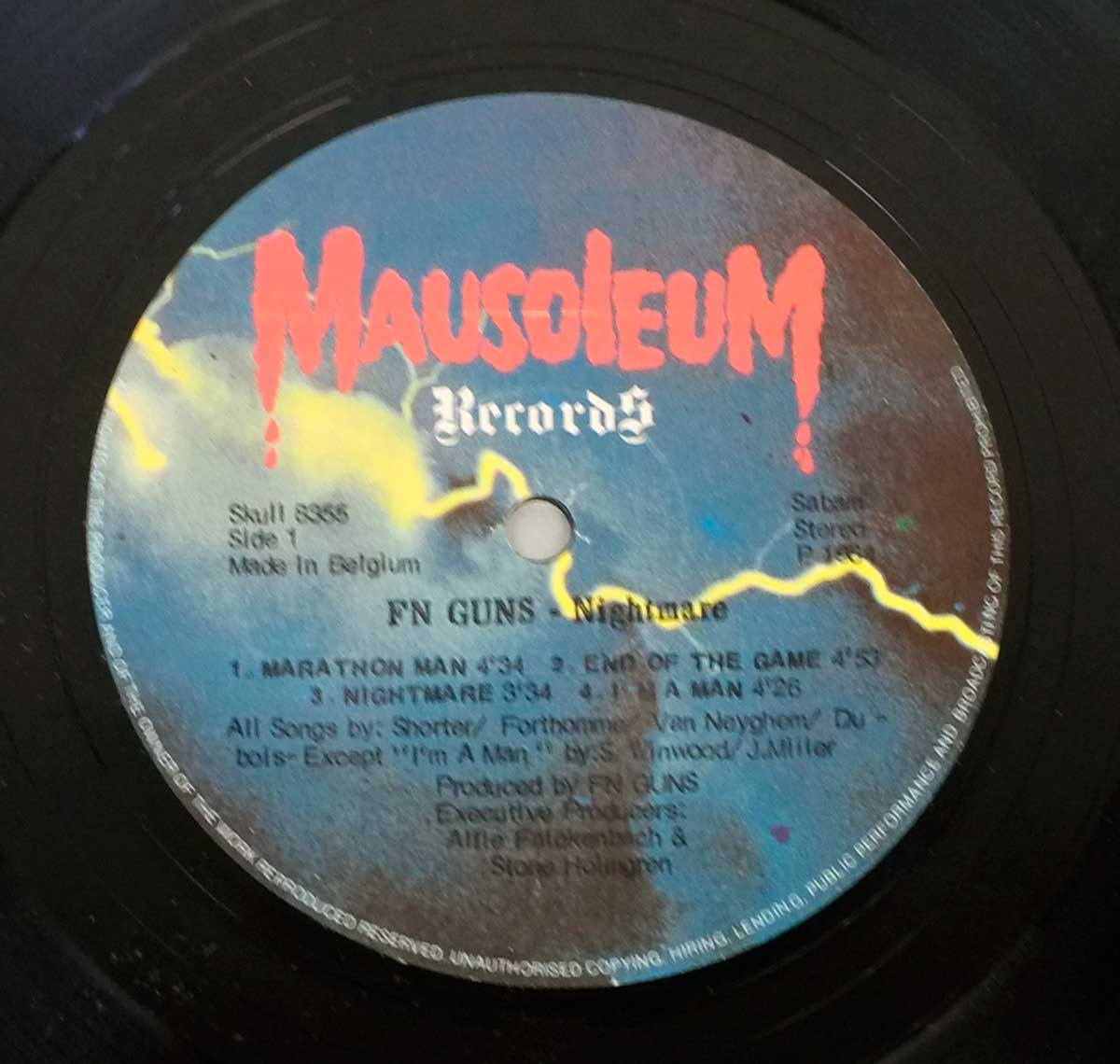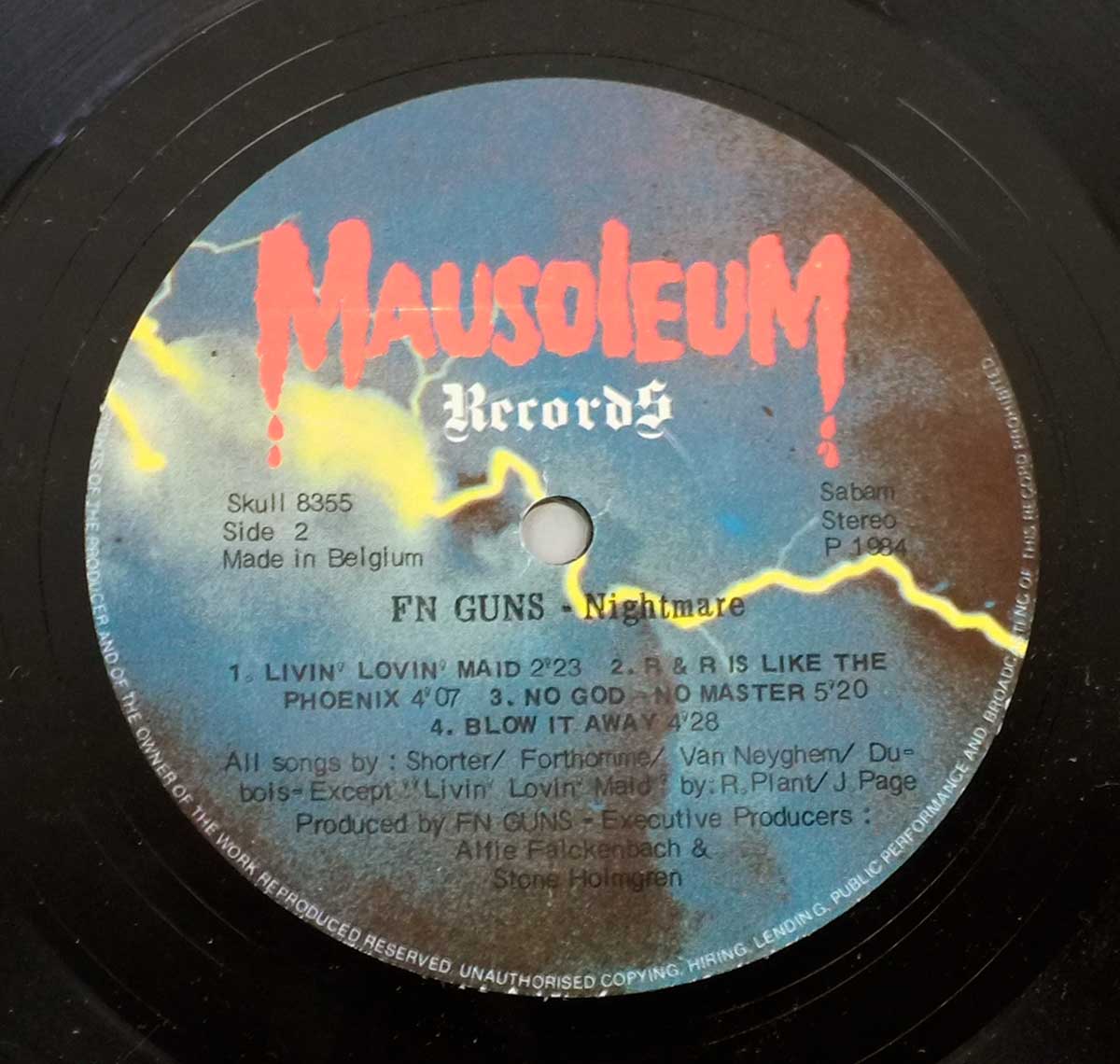Dark Horizons in the Belgian Metal Underground Album Description:
In the dense fog of early 1980s European metal, FN Guns emerged from Liège, Belgium with a mission: to bring high-octane, riff-driven heavy metal to the fore. Their 1984 release "Nightmare" was no mere demo dressed in denim and leather — it was a focused sonic assault, engineered with the clarity of purpose that came from both frustration and ambition. At a time when American glam metal was soaking up headlines and UK metal had matured into NWOBHM, FN Guns carved their niche with a distinctly continental aggression.
Exploring the Soundscape of "Nightmare"
The album opens with the pounding rhythm of "Marathon Man", showcasing the band’s love for speed metal rhythms and classic rock structures. The title track "Nightmare" dives deeper — a chilling, mid-tempo descent into existential unrest, carried by Steve Shorter’s snarling vocals and Dan Dubois’ razor-edged guitar tone. Lyrically, the band embraced themes of defiance, human frailty, and urban decay, wrapped in the gritty sonic cloth of 1980s European heavy metal. Tracks like "No God No Master" and "End of the Game" border on the political, challenging authority with fiery resolve.
The Production Ethos
Unlike many independent European releases of the era, "Nightmare" benefited from a production team that took the studio as seriously as the stage. It was co-produced by the band alongside Alfie Falckenbach and Stonne Holmgren — two visionaries behind Belgium’s Mausoleum Records. Their experience, notably with acts like Scavenger and Ostrogoth, gave "Nightmare" a muscular mix that retained rawness without descending into lo-fi murk.
Shiva Studio: The Crucible of Belgian Metal
The album was recorded at the now-legendary Shiva Studio in Brussels, a site that became a crucible for many Belgian heavy metal acts during the decade. Engineer Patrick Cogneaux helped sculpt the record’s balance between melodic clarity and relentless attack. Shiva’s analog warmth and reverb-soaked space added depth to the guitars and punch to the rhythm section — it wasn’t slick, but it was sincere.
Controversies and Resistance
While not embroiled in tabloid-level scandal, FN Guns’ unapologetic lyrical stance — especially on songs like "No God No Master" — earned them subtle pushback in conservative local circles. Some club promoters hesitated to book them, viewing their name (a pun on firearms manufacturer FN Herstal) and lyrics as provocations rather than poetic license. Yet such friction only added fuel to their mission: FN Guns were determined to be loud, proud, and unfiltered.
Genre and Identity
Categorizing "Nightmare" is no easy task — its DNA is part classic heavy metal, part speed metal, and part defiant pub rock. Think early Accept meets Motörhead in a Liège warehouse. The basslines of Chris Forthomme are more than support; they’re the record’s steel spine. Drummer Marc Van Neyghem delivers tight, hammering patterns that never stray into indulgence. FN Guns thrived in a genre intersection, refusing to chase the MTV polish of American counterparts while holding their own against NWOBHM’s polished savagery.
Artistic Presentation
Visual aesthetics mattered, and FN Guns knew it. The cover artwork — designed by Eric Philippe and shot by Jean Marie Ansay — adds a macabre elegance to the album’s sonic darkness. It’s gothic without veering into fantasy, perfectly embodying the band’s grounded yet ominous tone.
F.N. Guns was a Belgian heavy metal band formed in 1982 in Liège. Known for their raw energy and blend of hard rock and classic heavy metal, the band took its name from the famous Belgian firearms manufacturer FN Herstal.
They emerged from the early European metal underground with self-released tapes before signing to Mausoleum Records, where they released notable albums like "Nightmare" (1985) and "Burnin’ Out" (1987). Their music combined gritty riffs, aggressive vocals, and high-speed rhythms, gaining them a cult following in Belgium and beyond.
Despite lineup changes and shelved projects, F.N. Guns continued recording into the 1990s and briefly reunited in 2014, leaving behind a legacy of no-frills, working-class metal true to the spirit of the '80s.



